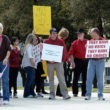“THE REPUBLICANS BEGAN TO THINK OF BILL CLINTON as Godzilla,” a senior member of the House Judiciary Committee told me during an interview four years ago. “No matter what they did to him, or how hard they knocked him down, he got back up and kept coming at them.” Stuff his health-care reform plan and hang the First Lady out to dry; win control of the House and flood the White House with spurious subpoenas; shut down the government in a budget fight. For Bill Clinton, it all came with the job. Defeat after defeat, he took his beating, got up, and walked back into the fight.
The interview I refer to was done while I was writing a book about Tom DeLay, who as Majority Whip single-handedly drove the movement to impeach Bill Clinton, when most House Republicans wanted to walk away from what they viewed as an act of excessive partisanship. DeLay used his leadership position to force his colleagues to abuse one of the most sacrosanct constitutional powers the framers had provided the Congress: the authority to remove the president from office for high crimes and misdemeanors.
Bill (and Hillary) Clinton responded to the impeachment as they always respond to adversity. Their resolve and willingness to fight in the face of the now disgraced and departed Republican’s abuse of his elected office and the Constitution was as remarkable as it was admirable. The country is now in the process of learning if that resolve is an asset or a liability in a national political campaign.
More and more, it looks like a liability.
LONG COUNT IN TEXAS—The Democratic presidential race should have ended in Texas, where the Obama campaign closed a double-digit gap in a month and came very close to winning the state. In fact, Obama “won” Texas, even if it required almost a month to nail down the 183 delegate count. He stayed very close to Hillary Clinton in the popular vote (47-51 percent), by which two-thirds of the state’s delegates were allocated. And he dominated the 8,000 precinct conventions that allocated one-third of the delegates. (The post-election precinct conventions, open to anyone who cast a vote in the primary, were so overwhelmed by Obama voters that the count was suspended and votes were still being canvassed weeks after they were cast.) When precinct convention votes were finally counted and certified at county conventions on March 29, Obama ended up with 99 delegates to Hillary Clinton’s 94.
Obama might have won the popular vote outright, but for Republican crossovers in the open primary. In East Texas, local Republican Party activists urged traditional Republican voters (there is no party registration) to vote Democratic and for Hillary, whom they consider the weaker match against John McCain. The Texas Observer‘s Dave Mann quickly reported that right-wing talk radio was urging Texas Republicans to vote for Clinton. In the week after the election, Royal Masset, a veteran Republican political consultant in Austin, was giving his party’s cross-dressers credit for swinging the popular vote to Clinton.
But you’ve got to give the Clinton operation credit. In a state where they were written off by many, outspent two to one on media buys, outperformed at big events, and confronted by a youthful insurgency they didn’t seem to understand, Hillary Clinton’s campaign delivered. This was all the more striking considering the obstacles they faced.
The Democratic Party in Texas barely has a pulse. (In fact, Dallas trial lawyer Fred Barron has stepped in to fill the vacuum, building a parallel party organization that has moved Dallas into the Democratic column and is now focused on Houston, which will soon follow.)
It had been years since any of the big players on Clinton’s team have had a dog in the hunt in Texas. All these guys had to be taught to ride and shoot again. Their marquee name, Garry Mauro, was elected land commissioner in 1982 and brought his political career to an end in 1998 by losing the governor’s race to George W. Bush by a 69-31 percent margin. Mauro; a handful of retired Hispanic state senators; South Texas political patrons—it wouldn’t have been surprising to see the ghost of Lloyd Bentsen turning out the vote on the border. There was, in fact, a public fight in Ann Richards’ family over which candidate—Clinton or Obama—the late Democratic governor would have backed.
Even Roy Spence, an ad agency owner and friend of the Clintons (he met them in 1972 when they came to Texas to work on the McGovern campaign), who put together the much-parodied “It’s 3 a.m. in the White House . . .” TV spot, had moved on from political to corporate clients. When these guys were at the top of their game, all twenty-two statewide elected offices were held by Democrats. Today every statewide seat is occupied by a Republican.
Yet Clinton’s team managed to get Hispanic voters to the polls in sufficient numbers to provide her with a 51-47 popular vote margin. Mauro had insisted that Clinton would carry the state if she could keep her Hispanic vote above 60 percent. Exit polls had Clinton winning two-thirds of the Hispanic vote, which made up 32 percent of the Democratic primary vote. Blacks, who were 19 percent of the primary turnout, went five to one for Obama. Not enough to counter Hispanic turnout for Clinton.
IT’S 3 A.M. IN TEXAS—“They won it ugly,” said an Austin political consultant associated with neither campaign. “They lied about NAFTA and ran on fear. What they did will come back to haunt the party in Texas.”
Ugly is in the eye of the beholder. The Clinton campaign won the popular vote in Texas by a narrow margin on the strength of a TV spot that exploited the fears of parents.
The “It’s 3 a.m.” Roy Spence ad features children sleeping in their beds while a phone rings in the background. The phone is ringing in the White House, where it is answered by Hillary Clinton—the candidate who is seasoned, mature and tested and who knows the world’s leaders. It complemented Senator Clinton’s argument that Barack Obama is not as fit as she is to serve as commander in chief. By playing the fear card late in the campaign and forcing Obama off his message and into a defensive posture, the Clinton campaign peeled off just enough votes to live to fight another day.
The Austin consultant who complained that the Clintons “won ugly” was rankled not only by the TV ad but also by Hillary Clinton’s claim that she had always opposed NAFTA—the North American Free Trade Agreement. The consultant was present (as I was) at the January 1993 “Austin summit,” when then-Governor Ann Richards brought Mexican President Carlos Salinas de Gortari and President-elect Bill Clinton together to promote NAFTA.
“I was in the room,” the consultant said of the NAFTA policy meetings. “NAFTA was the centerpiece of Bill Clinton’s first term. [Treasury Secretary] Bentsen was pushing it, and Benten’s staff was working on it. It was a priority for the administration, and Hillary was part of the team.”
But timing matters in political campaigns.
“TOTALLY PRO-NAFTA”—It wasn’t until two weeks after the March 4 Texas and Ohio primaries that the Bill Clinton Library released Hillary Clinton’s White House schedules, which documented her participation in the coordinated campaign to get NAFTA through Congress. Based on her own records, Clinton attended at least five meetings in 1993 when NAFTA was promoted. Others “in the room” at one meeting told ABC News that Hillary was not just in the room, she was in the deal. “Her remarks were totally pro-NAFTA and what a good thing it would be for the economy,” one attendee said. “There was no equivocation about her support for NAFTA at the time.”
Hillary Clinton’s 1993 position on NAFTA wasn’t the closer in the Texas primary; the fear-of-terrorism ad that forced Obama off message was. But the NAFTA controversy, which bitterly divided Texas Democrats in 1993, returned to divide them again.
Yet the Texas primary brought new life to a moribund state party, most of it in the form of younger voters turning out in record-setting numbers to support Obama. Their passionate commitment to their candidate was evident in the fact that many of them didn’t vote in down-ballot races, voting only for their presidential candidate at the top of the ticket, according to analysis by the Dallas Morning News. It was, however, their guy who got stiffed in what is widely perceived to have been an election won on fear and deceit. Those Obama Democrats, the first new blood the party has seen that wasn’t drying on the floor, might not come back if Hillary Clinton gets the nomination.
THE ALAMO IN PITTSBUGH—“You can’t get the hell out of Texas,” sings the Austin-based swing band Asleep at the Wheel. But both campaigns cleared out and moved on to Pennsylvania, as the precinct vote count in Texas dragged on. In Pennsylvania, as in Texas, voters are migrating from the Republican to the Democratic Party. Five days before registration closed, the Democrats had enrolled 111,000 new voters, in comparison to 13,000 new Republicans.
Unlike Texas, Pennsylvania has closed primaries, so there is no possible crossover without registration. Philadelphia political consultant Neil Oxman said that some of those voters will be Republicans responding to the entreaties of Rush Limbaugh to register Democratic and thereby influence the race. “They’re following the Republican thought machine,” Oxman said. But Oxman, who is working for neither campaign, said most of the new Democrats have been brought in by labor-intensive registration drives run by both Democratic campaigns. According to Oxman, the Obama campaign has done a better job of registering voters, making up, in this way, perhaps 2 percent of the deficit that Obama faced as the candidates hit the ground in Pennsylvania.
Franklin & Marshall College professor G. Terry Madona’s polling in early March had Clinton up by 16 percent. But Madona said in an interview that by the April 22 date of the primary the race could be far tighter than the polling suggested. It remains Clinton’s to lose, he said, because she runs so strong among elderly Democratic voters. Pennsylvanians are disproportionately elderly—”more senior, more union, and more elderly,” Madona said.
Oxman, who has run statewide campaigns, agrees. “The Clinton campaign has a home-court advantage in Pennsylvania,” Oxman said. He described a state in which the Democratic primary is dominated by older women voters, on whom Hillary Clinton has a lock. Democratic women, in fact, are supporting Clinton by a two-and-a-half-to-one margin in most polls. Oxman also pointed to the support of white, blue-collar Democrats, and of union members.
Clinton, moreover, has been endorsed by Governor Ed Rendell and the mayors of Philadelphia and Pittsburgh. Madona says Rendell is campaigning for this race with an intensity the governor and former Philadelphia mayor has only demonstrated in his own campaigns. So Clinton owns the Democratic Party establishment. Oxman also expects the gap to narrow, but Clinton still holds the advantage. Philadelphia County, he said, is the only county in the state that Obama is certain to carry.
THE OTHER PENN PROBLEM—The Obama campaign is flush with money. And where Texas has twenty media markets in which candidates have to buy ads, Pennsylvania has only six. Obama was first on the air with TV ads in all six Pennsylvania media markets, blanketing the state on March 24, a month before the primary.
The same week Obama was saturating the state with paid ads, Hillary Clinton was working what’s known as “free media,” sitting down with the second-tier Pittsburgh Tribune-Review and making news. It was an ironic meeting that seemed to bring her political career full circle. The paper is a loss leader owned by Richard Mellon Scaife. Scaife’s millions underwrote the “Arkansas Project,” which set out in search of dirt on Bill Clinton during his first campaign for the presidency, then published it in the right-wing American Spectator. Scaife continued to support such right-wing claptrap with regard to the Clintons until the impeachment exhausted the right wing of the Republican Party.
As the editorial board meeting began, with Scaife sitting in, Clinton joked that she decided to meet with the board because it was so “counterintuitive.” (Scaife wrote an amiable column about Clinton’s editorial board interview, published in the Tribune-Review on March 30.) But the interview with a right-wing editorial board reminded me of the Texas political consultant’s “winning ugly” comment.
Clinton used the opportunity to jump-start the debate on race, an issue that helps her with the working-class union Democrats (a.k.a. Reagan Democrats) she needs in order to win. Obama wins Philadelphia because the city itself is black and the suburbs home to the white, educated Starbucks liberals who have been drawn to his candidacy. As the race tightens, Clinton has to turn on and turn out Reagan Democrats, who are generally not comfortable with African-Americans. So she has returned to the liability that Obama turned into an asset with his remarkable speech on race.
“You don’t choose your family, but you choose what church you want to attend,” Clinton told theTribune-Review editorial board. She brought Jeremiah Wright and race back into the conversation at a news conference later in the day, saying, “Given all we have heard and seen, he would not have been my pastor.” Two weeks later, Clinton adviser Harold Ickes would raise the Pastor Wright issue in an attempt to convince superdelegates that Obama is “unelectable,” a term Clinton strategist Mark Penn has used to describe Obama.
As we go to press, some pollsters are calling the Pennsylvania race a statistical dead head, and Obama, who has raised far more money, is outspending Clinton 5-1. And the Clinton campaign is scrambling to recover from another Penn problem; the abrupt (and apparently forced) resignation of the campaign’s chief strategist, Mark Penn. Penn, a longtime Clinton associate, was also working as an advocate for the free-trade agreement with Colombia, selling the U.S. Congress an agreement that Senator Clinton opposes. It was all part of his day job as CEO of the PR combine Burson-Martseller Worldwide. When the Wall Street Journal reported that Penn had met with the Colombian ambassador, Penn had to step down as chief strategist.
It’s no secret that B-M is anti-union. The Nation‘s Ari Berman reported in June on a big union-busting campaign the firm had worked on. His reporting resulted in an angry letter from Teamsters Union president James P. Hoffa and Unite Here! president Bruce Raynor to the Clinton campaign.
The issue for which Penn was sacked couldn’t be worse timed. Not only does it bring into high relief the decadence that pervades presidential politics, but the Reagan Democrats Clinton is counting on to swing the election for her are universally opposed to free-trade agreements; they believe they are the cause of job loss and outsourcing in Pennsylvania. The Colombian government’s history of dealing with organized labor is hardly a plus for Clinton. And on the Monday after Penn stepped down, President Bush announced he was sending the Colombian trade agreement to the Congress.
We’re back to NAFTA, this time to Obama’s advantage.
For Clinton, the Alamo is now in Pennsylvania. Watch out for ugly.






0 Comments